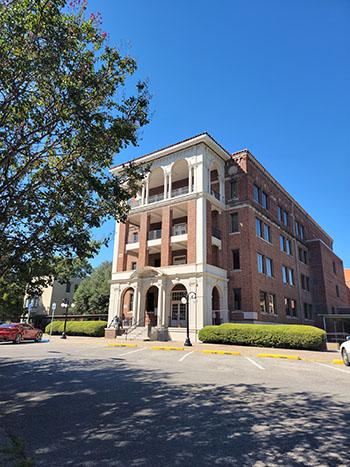In rural Texas, ERs are facing a growing mental health crisis
By Liza Kalinina, Texas Community Health News
May 7, 2024
For 24/7 mental health support in English or Spanish, call the Substance Abuse and Mental Health Services Administration’s free help line at 800-662-4357. You can also reach a trained crisis counselor through the Suicide and Crisis Lifeline by calling or texting 988.
Across the state, rural hospitals face a shortage of mental health care providers, with over 60% of rural counties designated as provider shortage areas by the Health Resources and Service Administration.
At the same time, the number of people experiencing mental health crises has increased, and these patients are often forced to seek care in the emergency room of rural hospitals, where they face long waits for treatment and use resources that are needed by patients with critical conditions.
Terry Scoggin, CEO of the Titus Regional Medical Center (TRMC), says his and other rural hospital ERs are the primary place where mental health patients are taken despite the fact that ER doctors are not trained to treat mental health conditions.
“The emergency department is a very hectic, chaotic, life-and-death area. It’s not the best environment for a mental health person or person with drug overdose,” Scoggin said.
Emergency rooms are a last resort for rural mental health
Situated in rural northeastern Texas, near the Arkansas border, Titus County has one psychiatrist and four licensed clinical social workers to serve 33,000 people in Titus and the surrounding counties. Accounting for population, that’s about two-thirds fewer providers than are present in the rest of the state, according to the Texas Department of State Health Services.
Titus’ mental health providers also care for patients in surrounding counties that have even fewer resources.
“We have one psychiatrist in the five counties that we support. So that gives you an idea of the lack of opportunities,” said Scoggin.
Without preventative care, people experiencing mental health crises in rural counties like Titus end up in the ER. Some are brought there after a public disruption. Others are brought by relatives.
Once in the ER, patients can spend days or even weeks waiting to be screened by a local mental health authority before they can be discharged or transferred. For patients at the Titus hospital, where there’s no psychiatrist on staff, that’s the Mount Pleasant Mental Health Clinic, which serves four counties and struggles to keep up with patient screenings.
In Titus, patients with mental health needs would typically be transferred to Terrell State Hospital, but the waits there are long, too.
“Terrell stays full. That is just the way it is, that’s not us, that’s Terrell,” said Rachelle Sills, director of the Mount Pleasant Mental Health Clinic. According to Sills, her team calls Terrell every day when they’re trying to transfer a patient, sometimes waiting as long as 14 days for an opening.
Kathy Griffis is the vice president of clinical operations and chief nursing officer at Titus Regional Medical Center. She worries for patients with mental health conditions — but also for her staff, who sometimes deal with violent patients during extended stays in the ER.
Brittany Bacak, a licensed clinical social worker, said that the isolation mental health patients experience while waiting in the ER can exacerbate their symptoms, leading to violence toward staff.
”When you put a client in a room, and you tell them that they have to stay in that room and they can’t leave that room for multiple days, people get agitated, right?” said Bacak, a lecturer at the School of Social Work at Texas State University who spent eight years working in Texas emergency rooms in both rural and urban hospitals in Bastrop, San Marcos and Austin prior to teaching.
Telehealth in ERs could reduce violence and get patients more timely care
Concerned with the long waits experienced by mental health patients in rural ERs and the associated danger to staff, Griffis worked with colleagues at Baylor University Medical Center and St. Luke’s Health in Lake Jackson to explore the use telehealth to help ER doctors treat mental health patients who end up in their department.
A year later, the state legislature allocated $7.4 million over two years to fund telepsychiatry consultations for rural hospitals, based on the work of Griffis and her colleagues.
A pilot program was launched in March in Titus and Knox counties. Texas Tech psychiatrists contracted by Texas Health and Human Services are available to rural hospitals seven days a week, 10 hours a day, enabling ER physicians to start treating mental health patients in the ER within the first 24 hours.
“Now we can at least get a diagnosis, a prescription, and possibly a discharge back into society and not a discharge to another hospital,” said Scoggin.
Sills, at the Mount Pleasant Mental Health Clinic, welcomes the program because it will reduce workload and help move patients to a more appropriate care setting in less time.
“We are such a high-crisis, high-volume clinic here that I think the local psychiatrists (through telemedicine) will really help the ER in maybe moving some of those people faster, whatever that means, getting them to another place or being able to advise them,” Sills said.
Griffis hopes to demonstrate the program’s efficacy and secure future funding, but the challenges of providing mental health care in rural areas extend beyond the ER. Due to provider shortages, accessing ongoing mental health care in rural communities is a challenge, even for those with private health insurance.
“I think we’ve got to relook at the infrastructure in our community for mental health,” Scoggins said.

This article originally appeared in The Texas Tribune at https://www.texastribune.org/2024/05/07/texas-mental-health-hospitals-er/.






